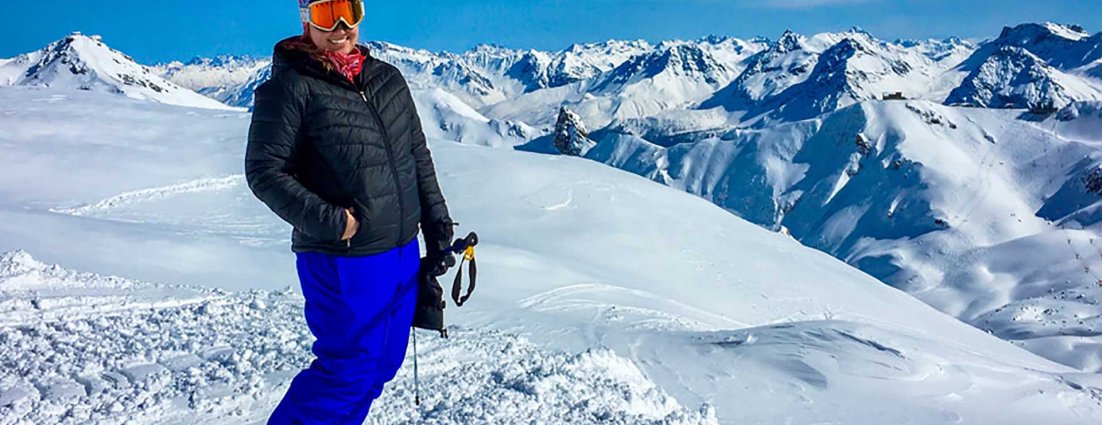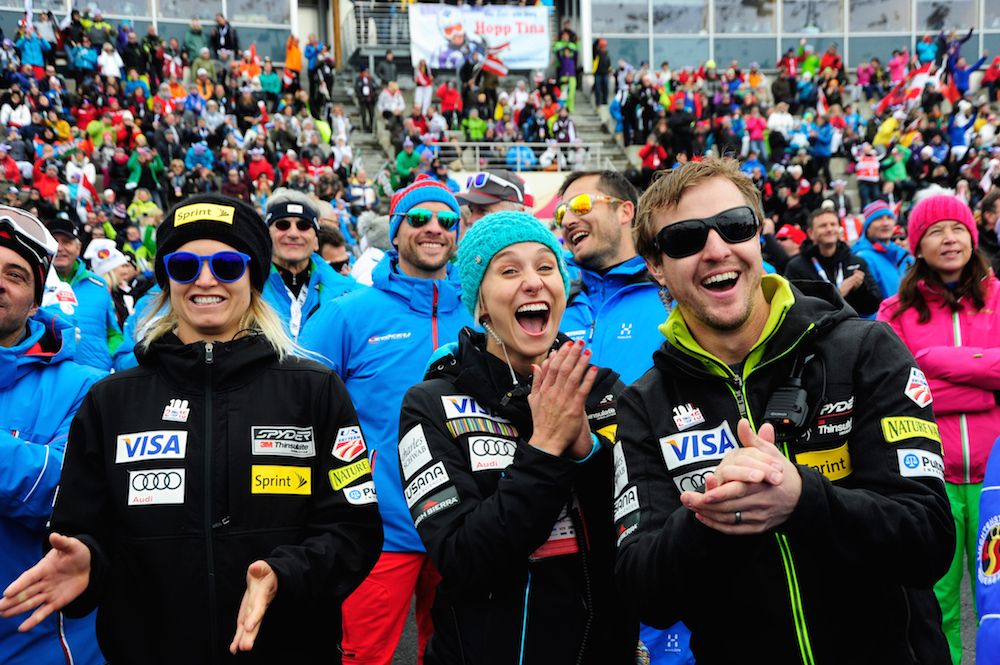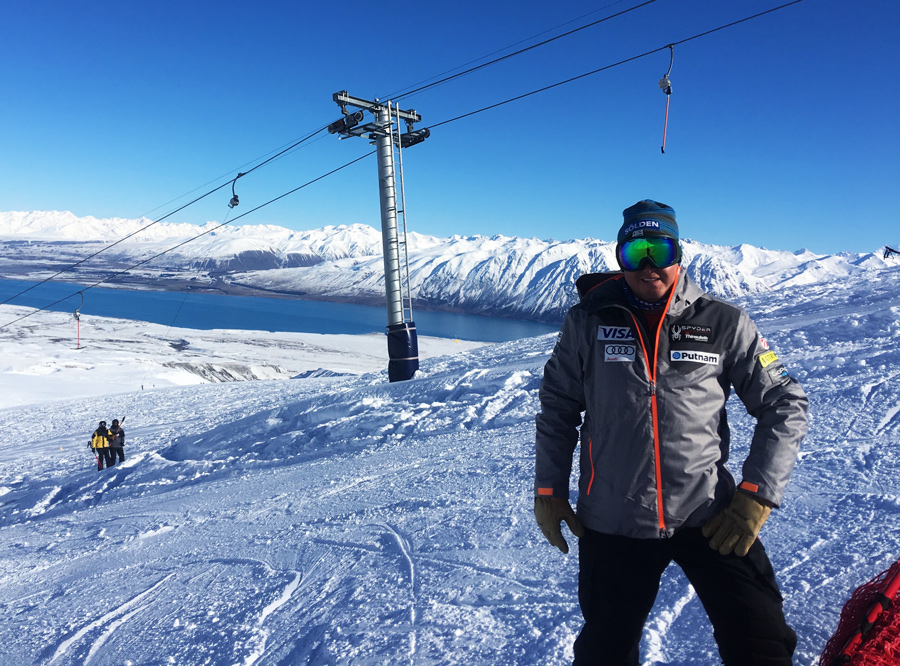Ski Racing Industry Jobs
02.08.2017 | Nastar Editor

Some of the most successful individuals working behind the scenes in the ski racing industry never graced the start house of a World Cup race as an athlete. There are a number of professional opportunities out there in the sport for even the most unsuccessful of ski racers to turn this passion into a career. But you have to maintain motivation and adjust some expectations if you want to be as thrilled to stay in the ski industry as these six individuals.
Steph Darling, Owner of R Tuning
“It doesn’t just disappear. It’s one of those sports that sticks with you until you’re in deep but love it too much to get out,” notes equipment servicewoman Steph Darling. Despite winning many major races when she was young, a series of injuries ended her hopes of racing for the U.S. Ski Team. “I always knew I wanted to work in the sports world,” explains Darling. While her professional career began a bit sooner than expected, Darling realized afterwards she had been building her clientele throughout her athletic career without even realizing it.
After establishing business roots in Salt Lake City, she and her husband, Kyle Darling, joined the staff at Stratton Mountain School as an equipment manager and coach, respectively. They now live in Waterville Valley, N.H., where Steph oversees the family tuning business while Kyle works as the Eastern Region development coach for USSA.
Not only did Steph’s athletic career kickstart her profession, but her involvement in the sport proved to be more useful than any business class could have been. “None of the business classes teach you how to deal with customers and form personal relationships; the most beneficial things I use now were learned through the ups and downs of being a full-time committed ski racer,” Darling confesses. To the racers whose athletic careers fall short to injury, Steph advises to keep things in perspective. “Remember why you started skiing,” she councils, “There’s nothing better than ripping a groomer in the East Coast – and you know you’re going to want to pass that onto your kids.”

Duncan Hurrelbrink, Dartmouth College Ski Patrol
Most high school-aged International Ski Federation (FIS) racers know that end of season burnout feeling well after juggling school, skiing, and travel for five straight months without a single morning sleep-in. Duncan Hurrelbrink of the Dartmouth Ski Patrol shares the sentiment. Hailing from Minnesota’s Buck Hill Ski Club, Hurrelbrink raced high school, USSA, and FIS events until his senior year. “By that time I was done with the sport. I still loved skiing, but [not] how much time racing sucked up.”
Now in his final year at Dartmouth College, Hurrelbrink is a senior member of the Dartmouth Ski Patrol at the famed Skiway. Not only has his work with the patrol reignited his passion for skiing in its purest form, but it has also given him a “point of pride” in being able to give back to the community that gave so much to him. “I believe it takes a village to raise a kid. For me, ski racing was that village, and only now do I realize just how big it is.”

Megan Harrod, U.S. Ski Team Press Officer
You wouldn’t believe it now, but U.S. Ski Team Alpine Press Officer Megan Harrod admits she “was kind of an outcast in the beginning. I was that girl with boots twice her size and all the wrong equipment.” A brave-hearted racer who got into the sport when she was seven, Harrod was a fun-loving competitor all the way through her USCSA (United States Collegiate Ski and Snowboard) career at St. Olaf College. She didn’t know in those formative years where this childhood passion would take her.
“Skiing has been such a big part of my soul and identity throughout my life that I knew I’d stay with it – even if I didn’t plan on it.” And not plan she did. While coaching on the side, Harrod primarily worked with a marketing agency that eventually asked her to relocate to Prague. Also spending time in Garmisch and Kitzbuehel, Harrod used personal connections to stay with the U.S. Ski team during their World Cup races. After leaving the agency in Prague, she returned to the U.S. to coach CrossFit and work on her co-owned textile backpack company Ethnotek.
Circling back yet again to skiing, Harrod utilized her friends on the team to help advertise her bags. Those backpacks and the Prague connection ultimately led to the job she holds now. “Within a day the guy [hiring for the position] got five emails from my friends on the team – he couldn’t say no to an interview after the sixth,” Harrod remembers. For skiers who never seem to find their niche, Harrod advises “never count it out” and “keep those relationships open, and be open to what they present.”

Graham Flinn, U.S. Ski Team Coach
Graham Flinn’s parents probably didn’t realize the influence the annual Warren Miller films might have on their son. For better or worse, Flinn caught a glimpse of some downhill footage in one of them as a child, and from there he was off to the races. After a fairly successful career in his younger junior years, Flinn moved onto Burke Mountain Academy and afterwards to the Park City Ski Team in hopes of qualifying for the U.S. development team. A self-admitted “lack of speed” became the simple yet frustrating barrier between Flinn and the national team. Struggling to find a job in which to apply his college degree during the recession in the 2000s, Flinn remained at St. Lawrence for an additional two years to earn a graduate degree and work as a ski coach.
“Coaching revealed how many other avenues within the sport there were to stay passionate about,” Flinn says. Currently the assistant men’s development team coach, Flinn appreciates the full-circle route that, like so many others, led him back to the racing community. He truly believes that “the people you meet and the experiences you have in this sport are once in a lifetime. They’re bonds that last forever.”
Phil Davenport, Windham Mountain Race Program Director
While some racers wind up back in the community by accident, others plan on it from the very day they learn to ski. Phil Davenport, current race program director at Windham Mountain in New York, grew up in the ski business. His parents opened and ran a small ski area known as Highmount starting in 1947. From Highmount out to Cornell University, Davenport knew his way around the hills of New York State better than anyone. “I knew that skiing would always be a part of my life, but I had no idea I’d go on to hold the position I do now.” Davenport’s primary source of dedication to the sport lies in his appreciation for a particular philosophy: “On a soccer [field] 50 percent of the people win, but in skiing it’s only one or two on a given day.”
“Winning really doesn’t matter in this sport,” continues Davenport. “It’s the healthiest sport I know. You don’t have to win to be proud.” And while that motto may hold true for other sports as well, it’s a firm reality in the grueling, rewarding, circular sport of ski racing.

Gabbi Hall, Digital Content Editor at SkiRacing.com
Current SkiRacing.com Digital Content Editor Gabbi Hall sums up many of these experiences well. “Being on a national team is great, but never getting there was great too because I got so much else out of skiing,” she reflects. Hall’s silver lining was her collegiate career. After graduating from St. Michael’s College, she worked as a media manager and, “absolutely loved what [she] was doing.” But she decided it was time for a change and applied her connections from ski racing when it came time to find something new, landing her job at SkiRacing.com in 2015.
“It was nice to get a break from the ski world. From a professional standpoint it’s very easy to get hyper-focused on one industry or one brand,” explains Hall. “If you’re not passionate about the racing aspect of skiing, you shouldn’t feel like you have to stick with it. But if you love the industry, then there are ways to stay in the sport without having to tune your skis only to get 31st place in race after race.” Hall’s last piece of advice for those who hope to stay in the sport is clear: “Just because you haven’t reached the goal you had in mind doesn’t mean you have to leave the sport altogether.”